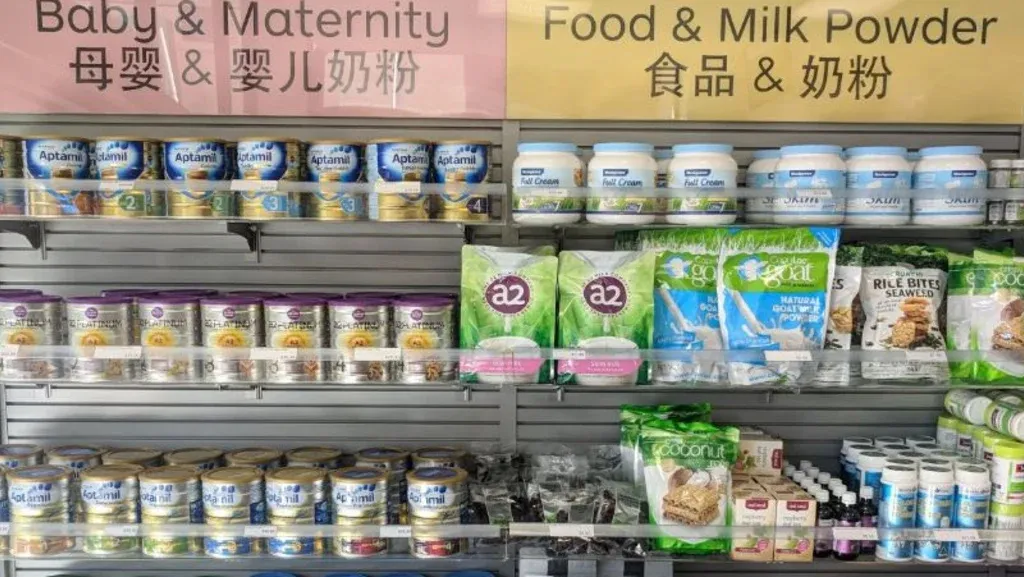Table of Contents
Launceston has long grown accustomed to empty shopfronts in its CBD, a trend only exacerbated by the Wuhan plague. So, when a new shopfront opens it naturally piques local interest. The more so when the shop sports entirely Chinese-language livery, is stocked with row upon row of baby formula – and seems mysteriously closed to the general public.
The shop in question is what is known as a “daigou store”, catering to expat Chinese (mostly students) who take orders via social media to ship back to China. These “daigou” (“buy on behalf of”) shoppers have been a lucrative business, often at the expense of locals, who’ve faced chronic shortages of Australian-made baby formula – so much in demand in China following its 2008 tainted milk scandal.
But not any more. Launceston’s daigou store may have jumped on the bandwagon a little too late. In the wake of COVID, the daigou business has collapsed.
Christine Liu has[…]gone from selling at least 300 tins of baby formula a month last year, to selling only 50 tins in September.
Ms Liu’s annual turnover has also halved from more than $200,000 last year when she earned about $20,000 in profit before tax.
“I was often overwhelmed by too many orders, but I’ve hardly had a message on my phone this year,” Ms Liu said.
“I am missing those busy days so, so much[…]
Australia’s multi-billion dollar daigou industry has been upended by the pandemic, with the effects being felt not just by thousands of personal shoppers but by major Australian businesses as well.
Empty baby formula shelves had become a regular phenomenon across Australia, but The a2 Milk Company — a popular brand among daigou clients in China — is now grappling with an oversupply of products.
While it’s hard to know which single factor has contributed most to the disruption, one problem has been the decline in overseas arrivals, particularly international students.
The ABC claims that supply has collapsed with the decline of Chinese daigou sellers arriving in Australia. Which makes it odd that those who are operating here are apparently twiddling their thumbs. In fact, stories like Christine Liu’s indicate that it’s demand, not supply, which has evaporated.
Liu blames “safety concerns” for the drop in demand, arguing that Chinese are afraid of catching the ‘rona from products from overseas.
But is that really the explanation? Or is the collapse of the daigou industry an oblique indicator that all is not as rosy in China as the CCP would have us believe. Official Chinese figures must always be treated with scepticism. The truth must often be gleaned from incidental data that slips outside Beijing’s scrutiny – such as the seven million phone subscribers who mysteriously vanished back in March. China is conceding that its economy has gone backward, but the collapse of daigou shopping may suggest an even harder contraction than Beijing wants to admit.
According to official data released in April, China saw its economy shrink for the first time since 1992, which has impacted the buying abilities of Chinese people.
“Chinese consumers have less buying power to buy imported products … also because of the [disruptions to] logistics, people can’t wait that long for products,” [Jerome] Fu said.
That “disruption” would include the failure of logistics suppliers as demand collapsed. Other businesses who’ve built their business model on China-dependency are also feeling the ripple effects.
As daigou sales collapse the fallout could also force some major ASX-listed companies to restructure.
“It’s a drop that is evident across ASX-listed companies that have China facing exposure, i.e. Blackmores or The a2 Milk, through to privately held businesses and brands that have let staff go, and pulled back in marketing spend and other consumer-driven activations,” [Swisse executive Jeremy] Hunt said[…]
COVID-19 also caused a 16 per cent decrease in net sales in Australia and New Zealand for vitamin company Blackmores.
Perhaps this should serve as part of the wider lesson the West has learned the hard way: it’s time to decouple their economies from China.
If you enjoyed this article please consider sharing it with your friends.









